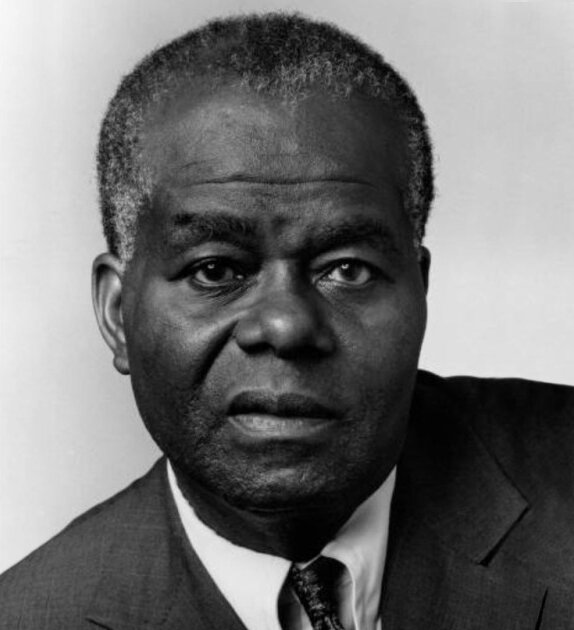Dr. John Henrik Clarke
January 1, 1915 - July 16, 1998
Dr. Clarke was a Pan-Africanist writer, historian, professor, and pioneer in the creation of Africana studies and professional institutions in academia starting in the late 1960s.
Born John Henry Clark on January 1, 1915, in Union Springs, Alabama, John left the family farm in Columbus, Georgia in 1933 to head to Harlem, New York during the period some historians refer to as; The Great Migration.
Clarke was a professor of Black and Puerto Rican Studies at Hunter College of the City University of New York from 1969 to 1986, where he served as founding chairman of the department. He also was the Carter G. Woodson Distinguished Visiting Professor of African History at Cornell University’s Africana Studies and Research Center.[6] Additionally, in 1968 he founded the African Heritage Studies Association and the Black Caucus of the African Studies Association.
John Henrick Clarke’s greatest period of influence resides in the 1960s where he was a prominent intellectual during the Black Power Movement, advocating studies on the African-American experience and the place of Africans in world history.
Clarke noticed that although many bible stories "unfolded in Africa... I saw no African people in the printed and illustrated Sunday school lessons," he wrote in 1985. "I began to suspect at this early age that someone had distorted the image of my people. My long search for the true history of African people the world over began."
That search took him to libraries, museums, attics, archives, and collections in Asia, the Caribbean, Europe, Latin America, and Africa.
What he found was that the history of black people is worldwide; that "the first light of human consciousness and the world's first civilizations were in Africa"; that the so-called Dark Ages were dark only for Europe and that some African nations at the time were larger than any in Europe; that as Africa sends its children to Europe to study because that is where the best universities are, early Greece once sent its children to Africa to study because that was where the best universities were; and that slavery, although devastating was neither the beginning nor the end of Black people's impact on the world.
Clarke gathered his findings into books on such figures as the early 20th-century mass movement leader Marcus Garvey, into articles with titles like "Africa in the Conquest of Spain" and "Harlem as mecca and New Jerusalem," and many books including American Heritage's two-volume "History of Africa."
While he was teaching at Hunter College in New York and at Cornell University in the 1980s, Clarke's lesson plans became well known for their thoroughness. They are so filled with references and details that the Schomburg Library in Harlem asked for copies. Clarke plans to provide them, he said, "so that 50 years from now, when people have a hard time locating my grave, they won't have a hard time locating my lessons."
In 1985, the year of his retirement, the newest branch of the Cornell University Library- a 60 seat, 9,000 volume facility- was named the "John Henrik Clarke Africana Library."
Check out the reading list compiled by Dr. John Henrik Clarke, Dr. Yosef “Dr. Ben” Ben-Jochannan, and Dr. Ivan Van Sertima.
The Harlem Writers Guild is a community of writers of African descent whose mission is to preserve the experience of black people in the written word. The Guild was founded as a writers workshop in the "Village" of Harlem in New York City in 1950. The founding members included: Dr. John Henrik Clarke, Rosa Guy, John Oliver Killens, Walter Christmas.
John Henrik Clarke: A Great and Mighty Walk, Grand Jury Prize/Best Documentary, UrbanWorld Film Festival
This video chronicles the life and times of the noted African-American historian, scholar and Pan-African activist John Henrik Clarke (1915-1998). Both a biography of Clarke himself and an overview of 5,000 years of African history, the film offers a provocative look at the past through the eyes of a leading proponent of an Afrocentric view of history. From ancient Egypt and Africa's other great empires, Clarke moves through Mediterranean borrowings, the Atlantic slave trade, European colonization, the development of the Pan-African movement, and present-day African-American history. '...compelling 'this look at an important though little-known African-American leader deserves to be seen. Recommended for large black history collections.' - Video Librarian
'Clarke's insights are challenging, thoughtful, and excellent starting points for class discussion. The work, like its subject, is organized, scholarly, and substantial." - School Library Journal
"...a veritable tour de force, plotting history from Africa's ethnographic presence, dating back to the early Egyptian dynasties to the Million Man March...The film is equal parts Baptist sermon and history." - New York Amsterdam News. The full video is show below.

